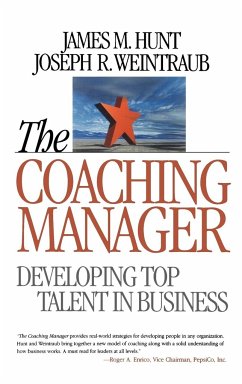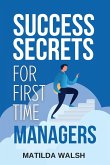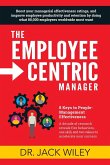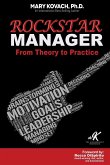- Gebundenes Buch
- Merkliste
- Auf die Merkliste
- Bewerten Bewerten
- Teilen
- Produkt teilen
- Produkterinnerung
- Produkterinnerung
Leadership coaching is an emerging profession in the field of management and psychology. Leadership coaches provide coaching services to teams and individuals in the process of examining leadership practices, communication patterns, and effectiveness within various professional settings. Practical and clearly written, this book introduces an easy-to-implement, developmental leadership coaching model based on the authors' extensive work with thousands of managers, executives and MBA students. The authors explain how to become an effective coaching manager and offer detailed guidance through…mehr
Andere Kunden interessierten sich auch für
![The Shrewd Manager The Shrewd Manager]() Anthony DickersonThe Shrewd Manager28,99 €
Anthony DickersonThe Shrewd Manager28,99 €![Success Secrets for First Time Managers - How to Manage Employees, Meet Your Work Goals, Keep your Boss Happy and Skip the Stress Success Secrets for First Time Managers - How to Manage Employees, Meet Your Work Goals, Keep your Boss Happy and Skip the Stress]() Matilda WalshSuccess Secrets for First Time Managers - How to Manage Employees, Meet Your Work Goals, Keep your Boss Happy and Skip the Stress25,99 €
Matilda WalshSuccess Secrets for First Time Managers - How to Manage Employees, Meet Your Work Goals, Keep your Boss Happy and Skip the Stress25,99 €![The Employee-Centric Manager The Employee-Centric Manager]() Jack WileyThe Employee-Centric Manager29,99 €
Jack WileyThe Employee-Centric Manager29,99 €![Economic Profits for the Small Business Manager Economic Profits for the Small Business Manager]() Conrad M. GovineEconomic Profits for the Small Business Manager19,99 €
Conrad M. GovineEconomic Profits for the Small Business Manager19,99 €![The Manager as Leader The Manager as Leader]() B. Keith SimersonThe Manager as Leader49,99 €
B. Keith SimersonThe Manager as Leader49,99 €![ROCKSTAR Manager ROCKSTAR Manager]() Mary KovachROCKSTAR Manager28,99 €
Mary KovachROCKSTAR Manager28,99 €![The Meaningful Manager The Meaningful Manager]() Jeff SmithThe Meaningful Manager15,99 €
Jeff SmithThe Meaningful Manager15,99 €-
-
-
Leadership coaching is an emerging profession in the field of management and psychology. Leadership coaches provide coaching services to teams and individuals in the process of examining leadership practices, communication patterns, and effectiveness within various professional settings. Practical and clearly written, this book introduces an easy-to-implement, developmental leadership coaching model based on the authors' extensive work with thousands of managers, executives and MBA students. The authors explain how to become an effective coaching manager and offer detailed guidance through numerous practical exercises and examples. Some topics covered include coaching to promote on-going career development, coaching employees with performance problems, and coaching in situations that are mediated by distance technologies: telephone, e-mail, web-based opportunities and teleconferencing.
Hinweis: Dieser Artikel kann nur an eine deutsche Lieferadresse ausgeliefert werden.
Hinweis: Dieser Artikel kann nur an eine deutsche Lieferadresse ausgeliefert werden.
Produktdetails
- Produktdetails
- Verlag: Sage Publications
- Seitenzahl: 272
- Erscheinungstermin: 1. Mai 2002
- Englisch
- Abmessung: 235mm x 157mm x 21mm
- Gewicht: 596g
- ISBN-13: 9780761924180
- ISBN-10: 0761924183
- Artikelnr.: 21285287
- Herstellerkennzeichnung
- Libri GmbH
- Europaallee 1
- 36244 Bad Hersfeld
- gpsr@libri.de
- Verlag: Sage Publications
- Seitenzahl: 272
- Erscheinungstermin: 1. Mai 2002
- Englisch
- Abmessung: 235mm x 157mm x 21mm
- Gewicht: 596g
- ISBN-13: 9780761924180
- ISBN-10: 0761924183
- Artikelnr.: 21285287
- Herstellerkennzeichnung
- Libri GmbH
- Europaallee 1
- 36244 Bad Hersfeld
- gpsr@libri.de
Dr. James M. Hunt is an associate professor of management and former Chair of the Management Division at Babson College, in Wellesley, Massachusetts. There he teaches leadership, talent development and creativity. James has consulted to numerous business and health care organizations on the development of an organizational coaching capability, executive coaching, and talent development by managers. His current research is on the relationship between creativity, uncertainty and career development. He co-lead the design of Babson's innovative Talent Management course in the MBA Program and lead the redesign team for Babson's flagship course, Foundations of Management and Entrepreneurship. Formerly, he was faculty co-director of the Babson College Coaching for Leadership and Teamwork Program and a founder and former faculty co-director of the Babson Executive Education Coaching Inside the Organization program, designed for organizational development and human resource professionals. James is coauthor of the book The Coaching Organization: A Strategy for Developing Leaders, a groundbreaking study of best practice companies and coaching, published by Sage (2007). Dr. Hunt graduated from the Massachusetts Institute of Technology with a bachelor's of science degree and received a doctorate in business administration from Boston University Graduate School of Management, where he studied career and leadership development and work/life balance
Preface 1. Introduction - The Coaching Manager Coaching Can Help, For Employees Who Want to Learn Why Don
t More Managers Coach? Developmental Coaching Coaching and Learning The Coaching Manager and Emotional Intelligence Coaching Isn
t the Same as Mentoring Coaching: Everybody Learns 2. An Overview of Developmental Coaching Developmental Coaching: An Example Why Such a Simple model? A Coaching Friendly Context A "Coaching Mindset" on the Part of the Coaching Manager The Coach-able Learner Making It Work: The Transition to Becoming a Coaching Manager Stopping the Action and Starting the Dialogue: Creating Coaching Opportunities The Coaching Mirror Providing Balanced Feedback Collaboratively Interpreting the Meaning of Performance Gaps Setting a Goal for Change and Following-Up As You Experiment with Coaching 3.: The Coaching Manager and the "Coaching Mindset" Coaching Managers Focus on Running a Business The Naturals The Manager Who Learns to Coach Can Anyone Learn to Coach? The Coaching Mindset: An Over-riding Attitude of Helpfulness The Coaching Manager Self-Assessment 3.1 Your Foundation for Learning to Coach 4. The "Coach-able" Learner The Question of "Coach-Ability" Case 4.1 - The reluctant coachee? In General, People Do Want to Be Coached Hallmarks of the "Coach-able" Learner The Problem of Impression Management Barriers to Coaching: What Does a Lack of Coach-ability Look Like? Coach-ability: Treat Each Individual as an Individual 5. Creating a Coaching Friendly Context Case 5.1 - Financial Co. A learning context? The Coaching Friendly Context Defined Coaching Friendly Context and the High Performance Organization Creating the Coaching Friendly Context in Your Business Unit Case 5.2 - Fred the Coach Protecting a Coaching Friendly Context Over Time 6.: Stopping the Action and Starting a Coaching Dialogue Case 6.1 - George, the Struggling Team Leader Seizing a Coaching Opportunity with a Coaching Mindset Stopping the Action and Starting the Dialogue: Practice Cases Case 6.2 - Is John Headed for Burnout? Case 6.3 - Samantha, The Frustrated Superstar 7. Focusing on What Is Important Not Just Process, But Results What Should Pay Attention To: Competency If Your Company Has a Competency Model If Your Company Does Not Have a Useful Competency Model The Coaching Manager as Teacher Strengths that area Used Self-Assessment 7.1 - How Clear Are You and Your Direct Reports 8.: Observing What is Important, Effectively Why is Performance Data: Even Observational Data, Suspect? The Real Problem: Our Tendency to Draw Inferences from Selected Data Error and Expectations: What You See Is What You Get Getting the Most From Direct Observation and Other Approaches The Coaches
s Role The Coaching Manager as Observer, Not Actor Exercise 8.1 - Observation and Inference 9. Providing Balanced and Helpful Feedback The Benefits of Feedback The Problem with Feedback Your Development as a Provider of Feedback The Basics of Providing Balanced Feedback The Emotional Impact of Feedback Maximizing the Value of the Imperfect Instrument that is Feedback 10. What Does It All Mean? Collaboratively Interpreting What Needs to Change Case 10.1 - What
s going on with Jack? Do You Need to Know Why? The Coaching Dialogue Root Causes The Importance of Getting it Right When Interpreting Performance 11. Goal Setting and Follow-Up, Making Change Happen Planned Development Exercise 11.1 - Your Own Development Plan Setting Goals How People Change Building Commitment for Learning and Change Goal Setting and Follow-Up: Conclusions Coach-ability: Treat Each Individual as an Individual 12. Coaching and Career Development An Overview of Career Development in the Modern Organization Personal Career Planning Using Developmental Coaching to Address Career Issues Coaching for Career Development, Some Examples Case 12.1 - The Employee Who is Bored with his Job Case 12.2 - The Employee Who Wants to Move Up (Too Fast!) Case 12.3 - The Employee Who is Good at his Work but Hates It Case 12.4 - The Employee with Work/Family Concerns Developmental Coaching and Career Development: Conclusions 13. Developmental Coaching and "Performance Problems" Causes of Performance Problems Addressing Performance Problems: Some Coaching Guidelines 14. Using Coaching to Leverage the Investment in the Classroom The Nature of the Problem Transfer of Learning Case 14.1 - The Wrong Executive Education Experience at the Wrong Time Case 14.2 - Leadership Education that Helped Case 14.3 - The Challenge of Becoming More Strategic Making the Most of Classroom Learning The Classroom and the Coaching Manager Epilogue: Coaching and Organizations, a Final Word Will Technology Help? Can Coaching be Delegated? The Relationship with the Coaching Manager is the Key What Should Organizations Do? A Final Word for Our Coaches, Old and New References Author Biographies
t More Managers Coach? Developmental Coaching Coaching and Learning The Coaching Manager and Emotional Intelligence Coaching Isn
t the Same as Mentoring Coaching: Everybody Learns 2. An Overview of Developmental Coaching Developmental Coaching: An Example Why Such a Simple model? A Coaching Friendly Context A "Coaching Mindset" on the Part of the Coaching Manager The Coach-able Learner Making It Work: The Transition to Becoming a Coaching Manager Stopping the Action and Starting the Dialogue: Creating Coaching Opportunities The Coaching Mirror Providing Balanced Feedback Collaboratively Interpreting the Meaning of Performance Gaps Setting a Goal for Change and Following-Up As You Experiment with Coaching 3.: The Coaching Manager and the "Coaching Mindset" Coaching Managers Focus on Running a Business The Naturals The Manager Who Learns to Coach Can Anyone Learn to Coach? The Coaching Mindset: An Over-riding Attitude of Helpfulness The Coaching Manager Self-Assessment 3.1 Your Foundation for Learning to Coach 4. The "Coach-able" Learner The Question of "Coach-Ability" Case 4.1 - The reluctant coachee? In General, People Do Want to Be Coached Hallmarks of the "Coach-able" Learner The Problem of Impression Management Barriers to Coaching: What Does a Lack of Coach-ability Look Like? Coach-ability: Treat Each Individual as an Individual 5. Creating a Coaching Friendly Context Case 5.1 - Financial Co. A learning context? The Coaching Friendly Context Defined Coaching Friendly Context and the High Performance Organization Creating the Coaching Friendly Context in Your Business Unit Case 5.2 - Fred the Coach Protecting a Coaching Friendly Context Over Time 6.: Stopping the Action and Starting a Coaching Dialogue Case 6.1 - George, the Struggling Team Leader Seizing a Coaching Opportunity with a Coaching Mindset Stopping the Action and Starting the Dialogue: Practice Cases Case 6.2 - Is John Headed for Burnout? Case 6.3 - Samantha, The Frustrated Superstar 7. Focusing on What Is Important Not Just Process, But Results What Should Pay Attention To: Competency If Your Company Has a Competency Model If Your Company Does Not Have a Useful Competency Model The Coaching Manager as Teacher Strengths that area Used Self-Assessment 7.1 - How Clear Are You and Your Direct Reports 8.: Observing What is Important, Effectively Why is Performance Data: Even Observational Data, Suspect? The Real Problem: Our Tendency to Draw Inferences from Selected Data Error and Expectations: What You See Is What You Get Getting the Most From Direct Observation and Other Approaches The Coaches
s Role The Coaching Manager as Observer, Not Actor Exercise 8.1 - Observation and Inference 9. Providing Balanced and Helpful Feedback The Benefits of Feedback The Problem with Feedback Your Development as a Provider of Feedback The Basics of Providing Balanced Feedback The Emotional Impact of Feedback Maximizing the Value of the Imperfect Instrument that is Feedback 10. What Does It All Mean? Collaboratively Interpreting What Needs to Change Case 10.1 - What
s going on with Jack? Do You Need to Know Why? The Coaching Dialogue Root Causes The Importance of Getting it Right When Interpreting Performance 11. Goal Setting and Follow-Up, Making Change Happen Planned Development Exercise 11.1 - Your Own Development Plan Setting Goals How People Change Building Commitment for Learning and Change Goal Setting and Follow-Up: Conclusions Coach-ability: Treat Each Individual as an Individual 12. Coaching and Career Development An Overview of Career Development in the Modern Organization Personal Career Planning Using Developmental Coaching to Address Career Issues Coaching for Career Development, Some Examples Case 12.1 - The Employee Who is Bored with his Job Case 12.2 - The Employee Who Wants to Move Up (Too Fast!) Case 12.3 - The Employee Who is Good at his Work but Hates It Case 12.4 - The Employee with Work/Family Concerns Developmental Coaching and Career Development: Conclusions 13. Developmental Coaching and "Performance Problems" Causes of Performance Problems Addressing Performance Problems: Some Coaching Guidelines 14. Using Coaching to Leverage the Investment in the Classroom The Nature of the Problem Transfer of Learning Case 14.1 - The Wrong Executive Education Experience at the Wrong Time Case 14.2 - Leadership Education that Helped Case 14.3 - The Challenge of Becoming More Strategic Making the Most of Classroom Learning The Classroom and the Coaching Manager Epilogue: Coaching and Organizations, a Final Word Will Technology Help? Can Coaching be Delegated? The Relationship with the Coaching Manager is the Key What Should Organizations Do? A Final Word for Our Coaches, Old and New References Author Biographies
Preface 1. Introduction - The Coaching Manager Coaching Can Help, For Employees Who Want to Learn Why Don
t More Managers Coach? Developmental Coaching Coaching and Learning The Coaching Manager and Emotional Intelligence Coaching Isn
t the Same as Mentoring Coaching: Everybody Learns 2. An Overview of Developmental Coaching Developmental Coaching: An Example Why Such a Simple model? A Coaching Friendly Context A "Coaching Mindset" on the Part of the Coaching Manager The Coach-able Learner Making It Work: The Transition to Becoming a Coaching Manager Stopping the Action and Starting the Dialogue: Creating Coaching Opportunities The Coaching Mirror Providing Balanced Feedback Collaboratively Interpreting the Meaning of Performance Gaps Setting a Goal for Change and Following-Up As You Experiment with Coaching 3.: The Coaching Manager and the "Coaching Mindset" Coaching Managers Focus on Running a Business The Naturals The Manager Who Learns to Coach Can Anyone Learn to Coach? The Coaching Mindset: An Over-riding Attitude of Helpfulness The Coaching Manager Self-Assessment 3.1 Your Foundation for Learning to Coach 4. The "Coach-able" Learner The Question of "Coach-Ability" Case 4.1 - The reluctant coachee? In General, People Do Want to Be Coached Hallmarks of the "Coach-able" Learner The Problem of Impression Management Barriers to Coaching: What Does a Lack of Coach-ability Look Like? Coach-ability: Treat Each Individual as an Individual 5. Creating a Coaching Friendly Context Case 5.1 - Financial Co. A learning context? The Coaching Friendly Context Defined Coaching Friendly Context and the High Performance Organization Creating the Coaching Friendly Context in Your Business Unit Case 5.2 - Fred the Coach Protecting a Coaching Friendly Context Over Time 6.: Stopping the Action and Starting a Coaching Dialogue Case 6.1 - George, the Struggling Team Leader Seizing a Coaching Opportunity with a Coaching Mindset Stopping the Action and Starting the Dialogue: Practice Cases Case 6.2 - Is John Headed for Burnout? Case 6.3 - Samantha, The Frustrated Superstar 7. Focusing on What Is Important Not Just Process, But Results What Should Pay Attention To: Competency If Your Company Has a Competency Model If Your Company Does Not Have a Useful Competency Model The Coaching Manager as Teacher Strengths that area Used Self-Assessment 7.1 - How Clear Are You and Your Direct Reports 8.: Observing What is Important, Effectively Why is Performance Data: Even Observational Data, Suspect? The Real Problem: Our Tendency to Draw Inferences from Selected Data Error and Expectations: What You See Is What You Get Getting the Most From Direct Observation and Other Approaches The Coaches
s Role The Coaching Manager as Observer, Not Actor Exercise 8.1 - Observation and Inference 9. Providing Balanced and Helpful Feedback The Benefits of Feedback The Problem with Feedback Your Development as a Provider of Feedback The Basics of Providing Balanced Feedback The Emotional Impact of Feedback Maximizing the Value of the Imperfect Instrument that is Feedback 10. What Does It All Mean? Collaboratively Interpreting What Needs to Change Case 10.1 - What
s going on with Jack? Do You Need to Know Why? The Coaching Dialogue Root Causes The Importance of Getting it Right When Interpreting Performance 11. Goal Setting and Follow-Up, Making Change Happen Planned Development Exercise 11.1 - Your Own Development Plan Setting Goals How People Change Building Commitment for Learning and Change Goal Setting and Follow-Up: Conclusions Coach-ability: Treat Each Individual as an Individual 12. Coaching and Career Development An Overview of Career Development in the Modern Organization Personal Career Planning Using Developmental Coaching to Address Career Issues Coaching for Career Development, Some Examples Case 12.1 - The Employee Who is Bored with his Job Case 12.2 - The Employee Who Wants to Move Up (Too Fast!) Case 12.3 - The Employee Who is Good at his Work but Hates It Case 12.4 - The Employee with Work/Family Concerns Developmental Coaching and Career Development: Conclusions 13. Developmental Coaching and "Performance Problems" Causes of Performance Problems Addressing Performance Problems: Some Coaching Guidelines 14. Using Coaching to Leverage the Investment in the Classroom The Nature of the Problem Transfer of Learning Case 14.1 - The Wrong Executive Education Experience at the Wrong Time Case 14.2 - Leadership Education that Helped Case 14.3 - The Challenge of Becoming More Strategic Making the Most of Classroom Learning The Classroom and the Coaching Manager Epilogue: Coaching and Organizations, a Final Word Will Technology Help? Can Coaching be Delegated? The Relationship with the Coaching Manager is the Key What Should Organizations Do? A Final Word for Our Coaches, Old and New References Author Biographies
t More Managers Coach? Developmental Coaching Coaching and Learning The Coaching Manager and Emotional Intelligence Coaching Isn
t the Same as Mentoring Coaching: Everybody Learns 2. An Overview of Developmental Coaching Developmental Coaching: An Example Why Such a Simple model? A Coaching Friendly Context A "Coaching Mindset" on the Part of the Coaching Manager The Coach-able Learner Making It Work: The Transition to Becoming a Coaching Manager Stopping the Action and Starting the Dialogue: Creating Coaching Opportunities The Coaching Mirror Providing Balanced Feedback Collaboratively Interpreting the Meaning of Performance Gaps Setting a Goal for Change and Following-Up As You Experiment with Coaching 3.: The Coaching Manager and the "Coaching Mindset" Coaching Managers Focus on Running a Business The Naturals The Manager Who Learns to Coach Can Anyone Learn to Coach? The Coaching Mindset: An Over-riding Attitude of Helpfulness The Coaching Manager Self-Assessment 3.1 Your Foundation for Learning to Coach 4. The "Coach-able" Learner The Question of "Coach-Ability" Case 4.1 - The reluctant coachee? In General, People Do Want to Be Coached Hallmarks of the "Coach-able" Learner The Problem of Impression Management Barriers to Coaching: What Does a Lack of Coach-ability Look Like? Coach-ability: Treat Each Individual as an Individual 5. Creating a Coaching Friendly Context Case 5.1 - Financial Co. A learning context? The Coaching Friendly Context Defined Coaching Friendly Context and the High Performance Organization Creating the Coaching Friendly Context in Your Business Unit Case 5.2 - Fred the Coach Protecting a Coaching Friendly Context Over Time 6.: Stopping the Action and Starting a Coaching Dialogue Case 6.1 - George, the Struggling Team Leader Seizing a Coaching Opportunity with a Coaching Mindset Stopping the Action and Starting the Dialogue: Practice Cases Case 6.2 - Is John Headed for Burnout? Case 6.3 - Samantha, The Frustrated Superstar 7. Focusing on What Is Important Not Just Process, But Results What Should Pay Attention To: Competency If Your Company Has a Competency Model If Your Company Does Not Have a Useful Competency Model The Coaching Manager as Teacher Strengths that area Used Self-Assessment 7.1 - How Clear Are You and Your Direct Reports 8.: Observing What is Important, Effectively Why is Performance Data: Even Observational Data, Suspect? The Real Problem: Our Tendency to Draw Inferences from Selected Data Error and Expectations: What You See Is What You Get Getting the Most From Direct Observation and Other Approaches The Coaches
s Role The Coaching Manager as Observer, Not Actor Exercise 8.1 - Observation and Inference 9. Providing Balanced and Helpful Feedback The Benefits of Feedback The Problem with Feedback Your Development as a Provider of Feedback The Basics of Providing Balanced Feedback The Emotional Impact of Feedback Maximizing the Value of the Imperfect Instrument that is Feedback 10. What Does It All Mean? Collaboratively Interpreting What Needs to Change Case 10.1 - What
s going on with Jack? Do You Need to Know Why? The Coaching Dialogue Root Causes The Importance of Getting it Right When Interpreting Performance 11. Goal Setting and Follow-Up, Making Change Happen Planned Development Exercise 11.1 - Your Own Development Plan Setting Goals How People Change Building Commitment for Learning and Change Goal Setting and Follow-Up: Conclusions Coach-ability: Treat Each Individual as an Individual 12. Coaching and Career Development An Overview of Career Development in the Modern Organization Personal Career Planning Using Developmental Coaching to Address Career Issues Coaching for Career Development, Some Examples Case 12.1 - The Employee Who is Bored with his Job Case 12.2 - The Employee Who Wants to Move Up (Too Fast!) Case 12.3 - The Employee Who is Good at his Work but Hates It Case 12.4 - The Employee with Work/Family Concerns Developmental Coaching and Career Development: Conclusions 13. Developmental Coaching and "Performance Problems" Causes of Performance Problems Addressing Performance Problems: Some Coaching Guidelines 14. Using Coaching to Leverage the Investment in the Classroom The Nature of the Problem Transfer of Learning Case 14.1 - The Wrong Executive Education Experience at the Wrong Time Case 14.2 - Leadership Education that Helped Case 14.3 - The Challenge of Becoming More Strategic Making the Most of Classroom Learning The Classroom and the Coaching Manager Epilogue: Coaching and Organizations, a Final Word Will Technology Help? Can Coaching be Delegated? The Relationship with the Coaching Manager is the Key What Should Organizations Do? A Final Word for Our Coaches, Old and New References Author Biographies








